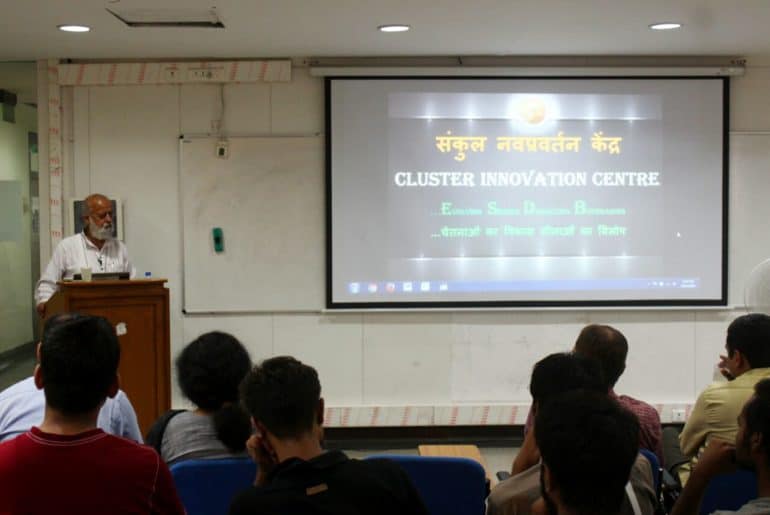Amidst various kinds of literature that we come across, one of the least known is oral literature. This is a rich form of literature which contains stories, histories and traditions that are passed on across generations orally. This literature which is mostly prevalent among natives and tribal communities is dying a slow death in the present era. In an attempt to conserve this form of literature, the students of B.A. (Humanities and Social Sciences) are creating awareness on orality via several projects, workshops and lectures. As part of this initiative, Sohail Hashmi, an eminent historian, academician and film maker delivered a talk on ‘Delhi –Forgotten Histories and Imagined Histories’ in Cluster Innovation Centre (CIC) on 6th October, 2016. This talk was a result of a collaborative effort by two ongoing projects in CIC, ‘Digital Repositories of Oral Stories’ and ‘Invisible Heritage: The historical gardens of Delhi’.
The talk began with Mr. Hashmi asking audience to separate mythology from history. He said, “In China there is a popular tale of a flying monkey. People tell this story to their children, but no one believes it to be real and in India, you all know who the flying monkey is”. He went ahead to dismiss some popular claims that is made by people of the ruling party at the centre and said “A quila in Delhi that is popularly known to be constructed by Prithviraj Chauhan, was actually never constructed by him.” He went ahead to prove his point by providing several evidences, one of them being that the plasters found on the wall did not exist at the time Prithviraj Chauhan ruled. Many other beliefs were dismissed by him among which several were from the book ‘Prithviraj Raso’ written by Chand Bardai, the court poet of Prithviraj Chauhan.
He went ahead to deconstruct several popular beliefs of the Mughal period saying ‘Jodhabai was not the wife of Akbar but his mother.’ He then clarified that the historian who recorded the Mughal history of India confused Akbar’s mother for his wife. Several other references are found which prove that it was Harkha Bae, who was Akbar’s wife and not Jodha Bai.
Shipra, one of the students who attended the talk said “The lecture inspired us to question even some of our own beliefs. There are many things which we all believe blindly. As students we should question everything that we come across.” The talk ended with the audience asking questions about the concept of Charbagh, the legendary history of Saraswati River and the Iron Pillar at Sarnath, all of which were answered by him very eloquently.
Srivedant Kar
Image Credits: Dushyant Yadav











